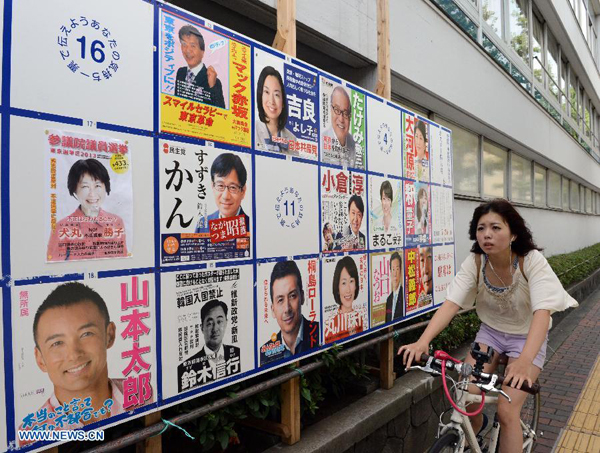Japan's ruling bloc wins upper house poll
 0 Comment(s)
0 Comment(s) Print
Print E-mail Xinhua, July 22, 2013
E-mail Xinhua, July 22, 2013
Japan's ruling camp, the Liberal Democratic Party (LDP) and the New Komeito Party, won the upper house election on Sunday, putting an end to the "divided Diet" and setting economic improvement as its priority after the control of both chambers of the Diet.
|
|
| A woman rides past an information board of candidates of the upper house election in Tokyo, Japan, on July 21, 2013. Voting for election of Japan's House of Councillors, or the upper house, kicked off at 7 a.m. local time on Sunday as the country's ruling bloc would set a victory in the polling, putting an end to the "divided Diet." [Ma Ping/Xinhua] |
The ruling bloc has secured 76 seats in the upper house election as the LDP and the New Komeito Party has secured 65 seats and 11 seats respectively. Along with the uncontested 59 seats of the two parties, the ruling camp has maintained a majority of 135 seats in the 242-seat upper house.
The ruling bloc also holds an overwhelming majority in the more powerful lower house, meaning that it has controlled both chambers of the Diet.
Japanese Prime Minister Shinzo Abe, also the president of the LDP, vowed at a press conference that he and his party will push forward their economic policies as the issue of a "divided Diet" has been resolved.
Abe the resolve of the "twisted Diet" means that his party can move forward the economic policies and "would like to make sure that Japanese people can really feel the effects of the policies."
Abe said his economic policies are a "right path to pursue" and highlighted that the election victory is a response from the voters towards the policies dubbed "Abenomics."
"We will let the real economy see the effect and let the people feel their income and wages increasing," said Abe.
The prime minister also said he will try to bring political stability to the country, adding the ruling bloc will decide things in a speedy and timely manner, while the LDP will stay at a "humble" manner when managing the Diet.
As to the constitution revision, Abe said he will not try to amend all articles at once and will start with the Article 96, adding he will ask the public opinion first.
"I believe people from the Japanese Restoration Party have the same idea, if we can have a majority in the Diet, I do hope that we can move forward on the issue," said Abe.
The three parties, namely the LDP, the Japan Restoration Party and Your Party, which support constitution revision, totally have 142 seats in the house, not reaching the two-thirds threshold to initiate an amendment.
On the issue of visiting the controversial Yasukuni Shrine, the hawkish leader said he will not clarify whether or not he will visit the shrine, which honors Japanese war dead and 14 war criminals during the World War II, as it may trigger diplomatic issues with neighboring countries.
"I believe it is natural to pay respect to people who fought for their country and I will show my respect to them," said Abe, adding that ministers of his cabinet will also make their own decisions on whether or not they will pay visits to the notorious shrine.
As to the opposition parties, the Democratic Party of Japan ( DPJ) secured record-low seats in the upper house with the number of 17 seats in the election.
Banri Kaieda, chief of the DPJ, said that the party's three years in power let voters down and the DPJ was not able to restore voters' confidence, adding he takes the responsibility of the outcome.
Senior official of the DPJ Sumio Mabuchi said in an interview that the election was a "very tough fight" and expressed his gratitude to the supporters and voters who cast their votes to the party.
"I gravely accept the outcome," said Mabuchi. The DPJ remained the largest party in the upper house before the election. The party was defeated by the LDP in the lower house election last December and was ousted from the ruling position.
The Japan Restoration Party won eight seats, which the party's co-head Toru Hashimoto said he can not consider it as a victory.
Hashimoto said in an interview that his party is not able to stop the LDP's momentum as voters have showed their expectations towards the LDP, adding the party will talk about the outcome among the leadership.
About his resignation, Hashimoto said that the issue will leave to the party's executive to decide.
Your Party and the Japanese Communist Party each got eight seats, while the Social Democratic Party secured one seat.
Individual runners have secured two seats, while the People' Life Party and the Green wind party gained no seat. A local party from Okinawa that calls for moving the U.S. Futenma airbase outside the prefecture gained one seat.
Compared with 57.92 percent in the previous election in 2010, voter turnout in the election is estimated at 51.57 percent, the lowest since the upper house election held in 1995, according to Japan's Kyodo News, which conducted the estimate on the basis of voter turnout data released by the election management committees of the country's 47 prefectures.







Go to Forum >>0 Comment(s)